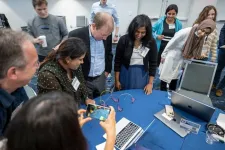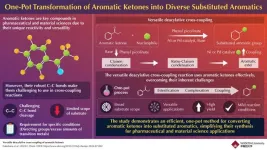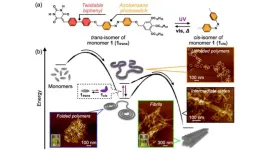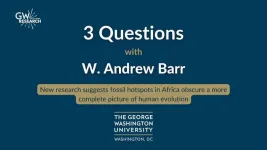For older adults living in retirement communities, there has been limited research on how the COVID-19 pandemic and its regulatory measures affected them. Additionally, there is scant research on any potential positive effects for this population.
Now, a new study of 98 older adults (median age 86 years) living in a continuing care retirement community in South Florida during COVID-19 reveals how this population not only bounced back from adversity, but also grew stronger from challenging experiences.
Researchers from Florida Atlantic University’s Christine E. Lynn College of Nursing explored both the challenges and growth experienced by the study participants as framed by “post-traumatic growth” theory, published in the Journal of Gerontological Nursing.
“Post-traumatic growth theory is a concept from psychology describing the positive change that can occur as a result of struggling with highly challenging life circumstances,” said Lenny Chiang-Hanisko, Ph.D., senior author and an associate professor, FAU Christine E. Lynn College of Nursing. “While trauma and adversity, like a pandemic, can lead to distress and difficulties, this concept suggests that some individuals experience significant personal growth following these experiences.”
Although the pandemic was a time of great stress and fear, the study results reveal that it also was a time of growth for many of the participants. With their usual routines disrupted, such as going for a walk with friends or sharing conversation during dinner, some discovered new interests and hobbies, such as gardening and painting. Others explored new ways to stay active, such as virtual yoga classes, online gaming and dancing. With more time at home, they found joy in exploring their creative side.
“Post-traumatic growth can lead to new possibilities, reevaluation of life goals, and pursuit of new opportunities,” said Chiang-Hanisko. “It also can result in stronger connections and relationships; increased resilience and confidence; deeper spiritual beliefs aligned with life purpose; and a greater appreciation for life, with a shift in priorities toward living fully.”
Findings show participants also deepened their relationships with family and friends, using video calls to stay connected despite social distancing. They drew on their life experience, including past hardships like recessions and wars, to cope with the pandemic. This period fostered reflection and spiritual growth, as many explored their beliefs and found solace in online religious services and a slower pace of life. The inability to see loved ones in person highlighted the value of these connections and led to greater appreciation for life’s simple pleasures. Daily gratitude helped them focus on the positives and navigate the challenges.
“Living through these experiences helped our study participants use their inner strength and muster the ability to adapt and bounce back in the face of the health challenge of COVID,” said Patricia Liehr, Ph.D., co-author and interim dean, FAU Christine E. Lynn College of Nursing. “Many of them indicated that with age comes the ability to see the bigger picture. Using this perspective helped them remind themselves that difficult times are usually temporary and that it is possible to find joy and meaning even during hardship.”
Despite barriers, study participants incorporated technology-related competencies, thereby affirming their potential to be open to new ways of accomplishing daily routines.
“Given what we learned from our study, there is enhanced awareness of a need for policy changes to ensure that everyone, regardless of age, has access to and training for internet and digital services that are user-friendly,” said Chiang-Hanisko.
Findings also show that participants faced challenges such as social isolation, managing pandemic restrictions and issues such as loneliness. Dining room restrictions were a major frustration as they limited social interactions. Despite these issues, 86% of participants’ medical conditions did not worsen, and all were vaccinated. Most (86%) supported the community's pandemic precautions. However, 51% reported psychosocial challenges, including anxiety (32%) and depression (31%).
Additionally, 26% knew residents who died from COVID-19, attributing deaths to factors like loss of will to live (35%) and social isolation (30%). Notably, 29% missed seeing their health care provider, while 59% used telehealth, and there was an increase in antidepressant and sleeping pill use.
For the study, researchers developed a survey questionnaire, which included open-ended questions such as “What was the single most difficult or serious effect for you during the COVID-19 pandemic?” “What did you do to manage the most troublesome effect?” “What is the single most important thing you have learned about yourself during the COVID-19 pandemic?”
“Post-pandemic questions still remain, including the potential for new forms of living arrangements in preparation for the next pandemic, as current facilities are vulnerable to a forthcoming crisis,” said Chiang-Hanisko. “The COVID-19 pandemic has highlighted the need for flexible, safe and socially engaging living arrangements for older adults that contribute to ongoing personal growth.”
Study co-author is the late Elizabeth Force, Ph.D., a medical researcher who valued the importance of nursing research focused on preventing disease, relieving suffering and improving health.
- FAU -
About the Christine E. Lynn College of Nursing
FAU’s Christine E. Lynn College of Nursing is nationally and internationally known for its excellence and philosophy of caring science. In 2024, the College was ranked No. 4 for the Family Nurse Practitioner Master’s concentration nationwide by U.S. News and World Report, No. 17 for “Best Online Master’s in Nursing Administration and Financial Leadership Programs” and No. 32 for the “Best Online Master’s in Nursing Programs.” In 2023, FAU graduates on the Boca Raton campus earned an 81% pass rate on the National Council Licensure Examination for Registered Nurses (NCLEX-RN®) and a 100% AGNP Certification Pass Rate. The baccalaureate, master’s and DNP programs at Florida Atlantic University’s Christine E. Lynn College of Nursing are accredited by the Commission on Collegiate Nursing Education. The College is the only one in the U.S. to have all degree programs endorsed by the American Holistic Nursing Credentialing Corporation.
About Florida Atlantic University:
Florida Atlantic University, established in 1961, officially opened its doors in 1964 as the fifth public university in Florida. Today, the University serves more than 30,000 undergraduate and graduate students across six campuses located along the southeast Florida coast. In recent years, the University has doubled its research expenditures and outpaced its peers in student achievement rates. Through the coexistence of access and excellence, FAU embodies an innovative model where traditional achievement gaps vanish. FAU is designated a Hispanic-serving institution, ranked as a top public university by U.S. News & World Report and a High Research Activity institution by the Carnegie Foundation for the Advancement of Teaching. For more information, visit www.fau.edu.
END






